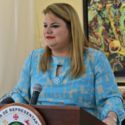As reported by PR51ST in the past, experts on U.S. law and policy on “free association” treaty law and U.N. decolonization resolutions believe U.S. citizenship will end if Puerto Rico becomes a sovereign “Free Associated State.” Now the mere suggestion that a “free association” affiliation treaty might include even temporary conferral of U.S. citizenship in a sovereign nation of Puerto Rico has become problematic for the federal and local government.
It started with a letter sent from eight U.S. Senators to U.S. Attorney General Sessions on April 5th. The letter opposed certification of the Puerto Rico government’s ballot for a future political status plebiscite, scheduled for June 11.
The senators claimed that voters would be “disenfranchised” if the “commonwealth” option were left off the ballot.
Puerto Rico’s non-voting Congresswoman Jenniffer Gonzalez-Colon sent a letter dated April 11 arguing that the local plebiscite enabling act meets the certification criteria prescribed by Congress in a 2014 federal plebiscite enabling act.
It came as no surprise that the letter from Gonzalez-Colon authoritatively rebutted the assertion made by the eight Senate cosigners of the letter opposing certification that “Commonwealth” is a viable option for the ballot. What perhaps was unexpected was the Congresswoman’s request for further consultation if the U.S. Attorney General might find one sentence in the ballot’s definition of the “Sovereign Free Associated State” option incompatible with federal law.
The content of the free association ballot option in question states that U.S. citizenship under free association status would be “negotiable.” Free association is a voluntary alliance between a new sovereign nation and an existing nation for mutually agreed support and assistance during the transition to full independence. It can be terminated at any time by either party, so establishing separate sovereignty, nationality and citizenship is required to make the association truly free and terminable in favor of independence.
Free association with mass dual citizenship and universal common rights in two countries without the same supreme national law and allegiance to one nationality is imperialism if not colonialism by another name. That is particularly true in the U.S. system of constitutional federalism where the rights of national citizenship and power of government by consent are exercised through state citizenship. For only citizens of a state can vote in federal elections for representation in Congress and the Electoral College.
Experts consulted by PR51ST advise that persons who acquired U.S. citizenship under federal territorial law could be allowed to retain it for life, subject to conditions and limitations to ensure allegiance to the United States. However, as a general rule passing U.S. citizenship to children born in Puerto Rico or otherwise expanding the population of U.S. citizens in Puerto Rico after it becomes a sovereign nation is “incompatible with the Constitution, laws and policies of the United States.”
Those same experts stated that the sentence in the ballot definition of free association under the local plebiscite act that states U.S. citizenship will be “negotiable” can be understood and interpreted in many ways, some incompatible with U.S law and some not.
For example, if interpreted to mean that retention or election of citizenship during a period for phasing out U.S. nationality are negotiable for those who already acquired it during the territorial period, that would seem to be negotiable consistent with federal law. But the U.S. State Department, Justice Department and Congressional Research Service have recognized in the past that mass common citizenship, sometimes collectively called “dual citizenship,” for the populations of two separate sovereign nations – even if freely associated by treaty – is legally and politically untenable.
If the ballot definition of free association is interpreted to mean continued federal statutory conferral of U.S. citizenship based on birth in a sovereign nation of Puerto Rico is negotiable, the only sense in which it could be deemed compatible with federal law and policy is that mere “negotiability” does not require the U.S. to agree to anything Puerto Rico might propose if free association is chosen by a majority of voters. Sine the sentence leaves the U.S. free to decline to continue U.S. citizenship under free association that provision is not strictly speaking incompatible with principles of federal citizenship law.
What Gonzalez-Colon seems to anticipate in her letter to Sessions is the logical and responsible if not necessarily required finding that the sentence added to the local plebiscite law suggesting future common citizenship is negotiable could be misleading to many voters.








No responses yet